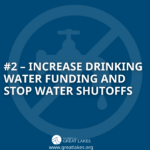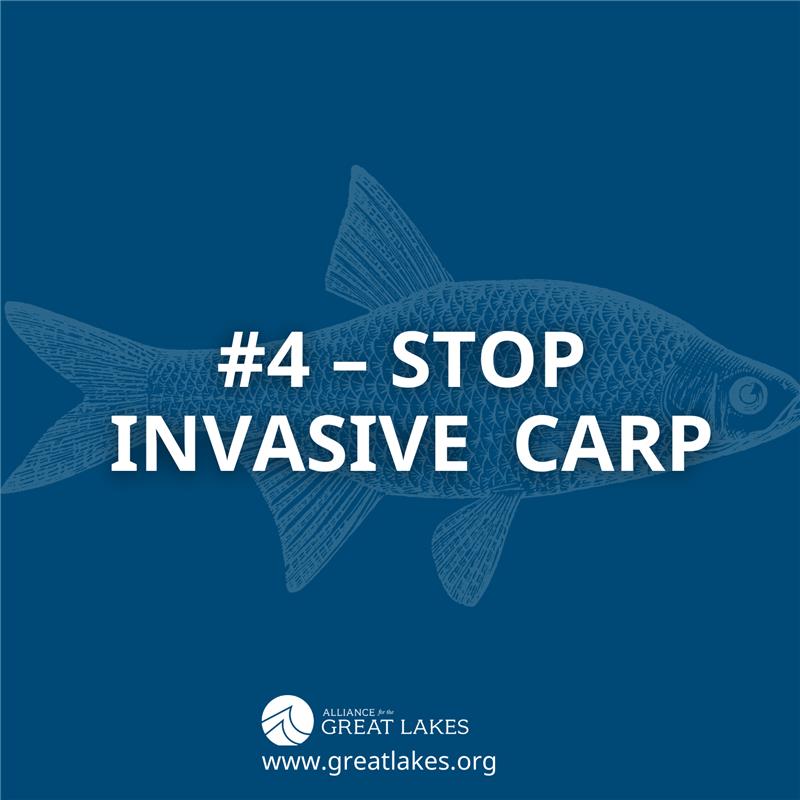
As the nation faces unprecedented challenges, clean water is more important than ever. The deepening COVID-19 crisis reminds us daily of the deep connection between clean water and public health. Investment in clean water programs supports getting people back to work and protects public health, a win for everyone.
The Great Lakes and our communities face serious challenges, from crumbling water infrastructure to the threat of invasive carp. Thanks to a strong, bipartisan focus on moving forward Great Lakes protections over the past decade, we have made significant progress toward our collective vision of safe, healthy Great Lakes accessible to everyone.
But much more remains to be done. We need to address places where systemic racism is undermining the protection of safe and clean water for all. Our vision of a healthy, safe Great Lakes for everyone includes addressing environmental injustices. It also means recognizing that a changing climate will make existing Great Lakes problems worse for the foreseeable future. There is no time to waste.
We have identified our top five priorities for Congress for 2021. We look forward to working with the 117th Congress to further advance Great Lakes protections.
1. Prioritize Environmental Justice

Low-income communities and communities of color are disproportionately impacted by pollution. Environmental justice seeks to address this unfair distribution of pollution and repair the harm that it causes. It requires the fair treatment and meaningful involvement of people of color and low-income communities in the development, implementation, and enforcement of environmental laws, regulations, and policies. The Great Lakes region has an opportunity to help lead the way.
There are specific actions the federal government can take to address environmental justice in the Great Lakes region right now including:
- Congress should reinstate the U.S. Environmental Protection Agency’s Office of Environmental Justice and fund it at $100 million per year. The office centralizes U.S. EPA’s environmental justice policy and decision making. It also ensures that communities of color and low-income communities have access to U.S. EPA’s expertise and can benefit from agency programs and funding. This office can provide leadership and support to U.S. EPA Region 5 and the Great Lakes National Program Office to ensure environmental justice objectives are set and met throughout programs that affect the Great Lakes.
- Congress should provide the U.S. EPA’s Great Lakes National Program Office with additional staff and funding to improve its outreach to communities of color and low-income communities. This will provide more opportunities for the public to learn about Great Lakes protection and restoration efforts and provide input and ideas to U.S. EPA about projects that would benefit their communities.
2. Increase Drinking Water & Wastewater Infrastructure Funding & Stop Water Shutoffs

Clean water is a basic need. No one should be without clean, safe, affordable water in their home. No one should have to worry about sewage backing up into their basement or community flooding that damages property. Yet, communities across the Great Lakes region continue to grapple with crumbling, antiquated drinking water and wastewater infrastructure. The longer we wait, the harder and more expensive these problems will be to solve.
The eight Great Lakes states need $188 billion over the next 20 years for improvements, upgrades, and repairs to this infrastructure. Paying for water infrastructure projects is expensive. Yet the costs to fix them are often not shared equitably, which underscores the importance of financial support from the federal government.
Clean water and water infrastructure are ever more critical in the midst of the COVID-19 public health crisis. Investing in clean water infrastructure is a win-win, creating jobs and protecting public health.
Congress should pass an infrastructure package that invests more than $100 billion over the next five years to address failing drinking water, wastewater, and stormwater systems.
Congress should also protect households and communities by:
- Enacting a federal ban on residential water shutoffs due to nonpayment and requiring reconnection of water service;
- Making permanent and clarifying the implementation of federal assistance programs for low-income communities and ratepayers passed by Congress in 2020;
- Increasing funds available as grants to utilities, with a particular emphasis on construction funding for lower-income communities, and flexible support to state and local governments in supporting affordability and assistance programs;
- Allocating a percentage of infrastructure funding for resilient nature-based infrastructure solutions.
3. Fund the Great Lakes Restoration Initiative & Increase Federal Agency Support for Clean Water Protections

The Great Lakes Restoration Initiative (GLRI) provides funding for on-the-ground restoration projects, from wetland restoration to cleaning up toxic hotspots, throughout the Great Lakes region. In addition to improving the Great Lakes ecosystem, the GLRI results in more than 3-to-1 in additional economic benefits across the region.
Congress should invest at least $375 million for the Great Lakes Restoration Initiative in FY2022, consistent with the Great Lakes Restoration Initiative Authorization Act that reauthorized the program through FY2026.
However, the GLRI on its own is not enough to protect and restore the Great Lakes and the communities that depend on them. The Great Lakes also need strong agencies to implement and enforce environmental laws. Congress should increase funding, including increased staffing for monitoring and enforcement of clean water, drinking water, and other critical environmental laws, for the U.S. EPA and other federal agencies that work to protect public health and the environment.
The U.S. EPA plays a critical federal role in safeguarding the Great Lakes, protecting our public health, and keeping our water safe and clean. It is essential that Congress support U.S. EPA to fulfill its mission to ensure that progress in restoring the Great Lakes is not undermined by the weakening of bedrock laws that protect clean water and the Great Lakes.
In recent years, regulatory rollbacks and staff cuts undermined the ability of the federal government, and in turn state governments, to protect the environment and people’s health. Cuts also undermined scientific research in government decisions and reduced U.S. EPA’s capacity to coordinate important regional projects like the Great Lakes Restoration Initiative and the Asian Carp Regional Coordinating Committee and the Great Lakes Water Quality Agreement with Canada.
4. Fund Efforts to Stop Invasive Carp
Invasive carp pose a clear threat to the Great Lakes. Established populations of these fish are only 50 miles from Chicago and Lake Michigan. But it’s not too late to prevent them from reaching the lakes.

To keep these fish out of the Great Lakes, the U.S. Army Corps of Engineers has proposed the construction of additional invasive carp measures at the Brandon Road Lock and Dam, located near Joliet, Illinois. After years of study and public debate, this project has been identified as the best step in stopping the fish from entering the Great Lakes and allowing waterborne commerce to continue moving through the lock. The project has wide bipartisan support and is authorized by Congress. To continue efforts to build invasive carp protections at the Brandon Road Lock and Dam:
- Congress should fund pre-construction engineering and design (PED) for the Brandon Road Lock & Dam project, a critical line of defense against the advance of invasive carp into the Great Lakes;
- Congress should adjust the non-federal cost-share requirement to allow for the construction of the project at full federal expense.
5. Fund Farm Bill Conservation Programs

Nutrient pollution that fuels harmful algal blooms is a significant threat to the region’s drinking water, quality of life, and economic well-being. Runoff from agricultural lands is a significant contributor to the phosphorus pollution that drives these blooms.
Farm Bill conservation programs are critical to addressing water quality problems caused by agriculture. But these voluntary programs are not enough to prevent this pollution. Farm Bill conservation programs should link funding with accountability to ensure that they are achieving clean water goals. To achieve this Congress should:
- Provide full funding for Farm Bill Conservation Programs as authorized in Title II of the Agriculture Improvement Act of 2018;
- Link federal conservation funding with measurable water-quality improvements and achievement of Clean Water Act Total Maximum Daily Load (TMDL) goals;
- Fund water quality monitoring and annual reporting on whether existing pollution control targets are being achieved in western Lake Erie and Green Bay.
Read our Top 5 Great Lakes Priorities for the Biden Administration.
